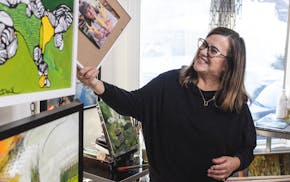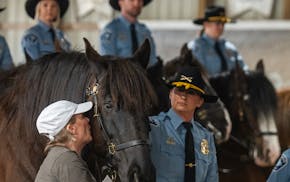What Nicole Mitchell did is bizarre, tragic and unlawful, if the police narrative of her breaking into her stepmother's home prevails. The state senator's apparent failed heist of her father's ashes and other belongings likely spells the end of her political career.
But the emotions behind it? I understand them.
Trauma after losing a loved one can make a person act out of character, if not out of their mind. An Air National Guard officer, former meteorologist, lawyer, single mom and staunch defender of children's rights, this promising first-term DFL legislator had everything to lose.
What possibly started with a fraught family relationship has now become Minnesota's hottest political story. If you recall, Mitchell, a 49-year-old from Woodbury, seemingly threw it all away last week when she dressed like a cat burglar and allegedly crept through the basement window of a Detroit Lakes home after 4 in the morning while her stepmom, Carol Mitchell, was still in her jammies.
Officers responded to Carol's 911 call and found a sock-encased flashlight in the home near Nicole Mitchell. A backpack got stuck in the window she clambered through. The bag contained her stepmom's laptop, something Carol said Mitchell didn't have permission to have. Mitchell was arrested at the scene and charged the next day with first-degree burglary.
Mitchell admitted to the responding officer, "Clearly I'm not good at this." No, Nicole, you are not.
According to the criminal complaint, Mitchell claimed her stepmother cut off communication with her. She said she was there to gather items of sentimental value: photos, her dad's ashes, his flannel shirt. He died last year.
That list may be a gut punch to anyone who's ever desperately believed like they could feel maybe whole again — if only they could touch and smell the things their parent left behind.
"I get the pain and the grief and the frustration," says Gina Smith of Montrose, Minn., whose father also passed away last year. "When you're already heartbroken and devastated, you just want closure."
Smith and her sister are in a similar situation now, though to be clear, they haven't broken into anyone's home and have no desire to do so. They're in the midst of trying to retrieve some of their late father's things from a stepmom who is having a hard time parting with them.
There's their dad's old Army jacket. One of his two Purple Hearts. A cloisonné vase and Japanese plates from his journeys throughout Asia. He traveled overseas to military bases for his work with the Department of Veterans Affairs during much of his daughters' childhood. Smith and her sister are asking for a written assurance that one day they'll get back those mementos from his travels.
"He sent these things back to the family, trying to make up for lost time," she said. "These aren't just things. They're memories. This is our dad's apology for not being there."
Smith said she wishes every parent would prepare a thorough will to spare their children from the agony of fighting for their parent's things.
"I still don't think it's right to break into that person's home to get it back," she said. "By all means, explore whatever avenues you have to get things back legally, but at a certain point, you have to be able to walk away."
It's never about the stuff. The stuff stands for something more. A father's regrets. A mother's devotion.
When Gayle Sherman Crandell's mom passed away about eight years ago, she wanted one item more than anything in her possession: a 1940s-era, spring-loaded egg chopper that her mom used to make her signature egg salad. The egg chopper stood for her youth and her relationship with her mom.
Sherman Crandell remembered sitting on the counter as a little girl, watching her mom slice and dice the eggs with that chopper, while she poured the mayo into the bowl. "It brought up all of these symbols of childhood, a simpler time when we felt very connected," she said.
When her mother died, "the first thing I wanted was to take and possess as many things of hers as I could. I wanted the bathrobe she used to wear, the shirt that reminded me of her," said Sherman Crandell, a Minneapolis-based grief therapist. "They made me feel closer to her. The loss is so big that we're sort of desperate to do anything to minimize that devastation."
Her stepfather graciously invited Sherman Crandell and her brothers to his home and take any of their mother's belongings that were meaningful to them. His kindness was no surprise to Sherman Crandell, since they always enjoyed a solid, positive relationship.
But blended families can sometimes carry extra complications when a parent dies. When did things go wrong between Mitchell and her stepmom? We don't know. Mitchell's father married Carol in 1983, and the legislator said in a statement that she's known her stepmom since she was 4 and deeply cares for her.
On Facebook two days after the alleged burglary, she posted an update about the incident saying she was conducting a welfare check on a family member who has been struggling with Alzheimer's and paranoia. Mitchell contends "a much different picture will emerge when all of the facts are known."
Her attorney, Bruce Ringstrom Jr., told me that "to render an opinion about the Senator while she is presumed innocent and without access to evidence that has actually been tested in court is hasty."
But her story has changed significantly from the night she climbed through the window of her stepmom's house, clad in all black, and allegedly told police, "I know I did something bad." It's hard to imagine anything she could say that could diminish her poor judgment and the impact her actions will have on a populace that already can't bring themselves to trust politicians.
Until this point, Mitchell has always struck me as a superhuman, measured in both achievements and decency. (We both worked at MPR News, and I wrote a column about her and fellow meteorologist Rob Kupec after they were sworn into the Senate.) Mitchell might deserve a second chance in politics, but it would be easier to make that case if she apologized for the actions that led up to her arrest.
She could start by saying she's in grief. That she's embarrassed by what she's done. That she's going to step aside while she receives professional help to heal.
And as a culture, we need to allow for people to talk openly about debilitating grief, the kind that makes a hard-working, respected legislator risk it all when she acted on the worst decision of her life.

Yuen: When cancer struck a second time, she found 'euphoria'

Yuen: The University of Minnesota's first male dance team member is turning heads by staying real
Yuen: How George Floyd's aunt healed her heart and lent her voice for justice

'This is an uprising': An oral history of the 6 days after George Floyd's murder



